Rachel Zucker on Her Book "SoundMachine"
When I tell people I’m a poet, they almost always respond, “What kind of poetry do you write?” Considering how many times I’ve been asked this question, it’s still surprisingly difficult to answer. Here are a few of the responses I’ve offered over the past 25 years:
“I write about my kids and family and body and life… it doesn’t rhyme.”
“Good poetry?”
“Sorta like Sylvia Plath but without the whole head in-the-oven part… so far anyway.”
“I write about things women aren’t supposed to talk about: sex, marriage, childbirth, childrearing, female desire, female rage, depression, anxiety… it makes me super popular.”
“I write long poems that tell stories, usually stories about me.”
“Unmarketable memoir. My books would all be bestsellers if not for the line breaks.”
“I write observational comedy that isn’t funny.”
The last response is plagiarized from a comment my husband, Josh Goren, made about my work. It wasn’t an insult—and, in case you were wondering, a lot of my work is funny or at least tragicomic. My husband, whose name, used as a verb, means “to joke,” is a huge fan of comedy and he was observing that my writing is closer to stand up comedy than lyric poetry.
Lately, I’ve considered asking the next person who asks me what kind of poetry I write if they’ve seen The Marvelous Mrs. Maisel. Like Midge Maisel, I’m a Jewish mother fighting against the reviled caricature of “The Jewish Mother.” Like Midge, I attended a fancy college and live on the Upper West Side. Like Midge, I’m a lot: talkative, ambitious, sensitive, full of outrage and love, and I make an extremely excellent brisket (I challenge any reader to a brisket contest). Did I mention I’m battling the stereotype of the Jewish Mother?
Like Midge, I speak very openly (obsessively?) about my marriage and children. Midge’s husband often feels eclipsed by her (as does mine), but is ultimately more in love with her and her ability than he is aggrieved that he’s not the brightest star in the family (as, thankfully, is mine). Midge’s father is hurt and angry with her for exposing him in one of her routines. My mother’s last words to me (relayed to me by her therapist) on the way to the hospital for emergency heart surgery from which she did not wake up were: “Tell Rachel not to publish the book.” My mother was talking about my book MOTHERs, which was, in part, about her, and which I did publish despite her dying wish. The fact that I just told you that story gives you some sense of what kind of poet I am. It’s a true story. I probably shouldn’t have just told it. And it’s not really funny. In fact, it’s really not funny.
Most of the pieces in my latest book, SoundMachine, don’t have line breaks and read as prose. I write about trying to explain death to my son as he’s falling asleep, about grief and loss, about my very long marriage, about my sons’ mental health struggles, about the boredom, restlessness, and suffocation of motherhood, about the excruciating, powerless responsibility of motherhood, and the struggle to make a home for my family and maintain a part of my soul, self, body, psyche that is not a wife and mother. I write about loving my children so much that I almost can’t but must endure the violence, hatred, toxicity, and precarity of our daily lives. I write about our political climate, the looming threat of environmental catastrophe, about insidiousness of white supremacy, toxic masculinity, and the heteropatriarchy, none of which I find funny even if humor is essential to our survival of these forces.
No one really knows what makes something funny, and what’s funny to one person isn’t necessarily funny to another. But provocation, making public what should remain private, voicing or describing something forbidden, and breaking taboos are often essential elements of humor. These are also elements of confessional poetry, which isn’t often funny. But, if I’m saying I do those things but no one laughs, and I’m saying I’m not that into Sylvia Plath, why do I do it?
I was raised to believe that lashon hora (gossip) is a serious injury and that honoring your parents is so important it supersedes “thou shalt not kill” in the ten commandments, but I was not raised with the sacrament of confession, the notion of original sin, or the Christian view that my thoughts were sins for which I should repent. Instead, Talmudic argument, midrash, and storytelling were at the heart of my upbringing, and openly expressing my feelings and ideas, even if these thoughts and emotions were difficult or unsavory, was encouraged.
Many of my favorite writers (and my parents’ favorite writers) use words to challenge repressive social norms. There is a lot of freedom for a provocateur in having been raised this way and in being praised for emulating artists who struggle with the ethics of speaking up, speaking out, speaking against, speaking about—whose art renders them exposed and naked and exposes the oppressive forces around us. Lenny Bruce, Spalding Gray, Sharon Olds, Adrienne Rich, Alicia Ostriker, Allen Ginsberg, Wayne Koestenbaum, Tig Notaro, Ally Wong, Alice Notley, Toi Derricotte, Bernadette Mayer, Art Speigelman, Audre Lorde, Joy Harjo, David Berman, Anne Sexton, Sacha Baron Cohen, Allison Bechdel (to name just a few of my influences) are truth tellers, risk takers, and poets in the sense that they are re-makers of forms.
I could tell people that I’m “a straight lady (pun intended) Allen Ginsberg.” I love Ginsberg’s poetry, but, like Midge, I’m no beatnik. Too many kids, more than two decades of monotony, oops, I meant monogamy, a day job, no acid trips. I enjoy a good rant, but, unlike Ginsberg, I’m not very prophetic in my poetics.
The thing is, Mrs. Maisel may be marvelous, but she didn’t exist. I do. My fashion sense is deplorable, my children are constantly interrupting me, and no one has ever described me as “marvelous.” The fictional character of Midge uses foul language and talks about things women were/are not supposed to talk about, but she’s not telling it like it is, and the show is a whitewashing of racism, misogyny, class differences, and the socio-political reality of the 1950s. (For two great responses to the show read Emily Nussbaum in The New Yorker and Rokhl Kaffrisin in Alma.)
It’s not a very snappy answer, but I write the kind of poetry that proves I exist, that I—a daughter, wife, and mother living a life of great privilege and difficulty at a moment in history when my body is both cherished and reviled, empowered and corseted by my gender, guided by (and away from) Jewish belief and sensibility—tried to love and care for others and tried to speak the truth, even when it wasn’t funny.
SoundMachine is one of JWA’s 2019-2020 Book Club picks.

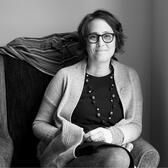
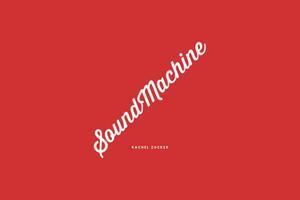
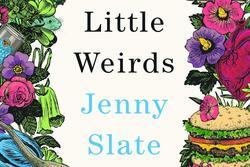
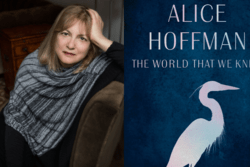
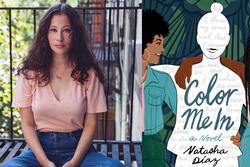


Thank you for sharing. I love your voice and body of work.